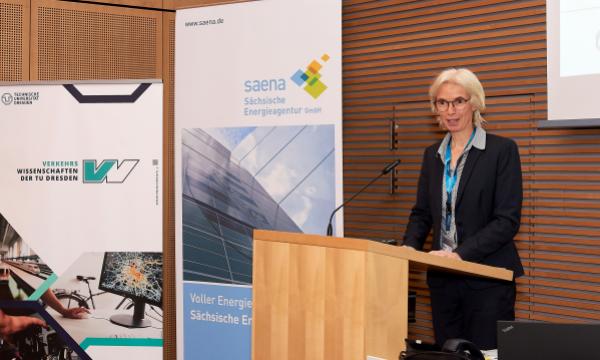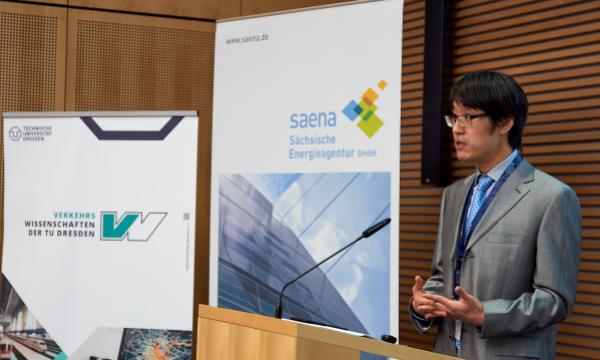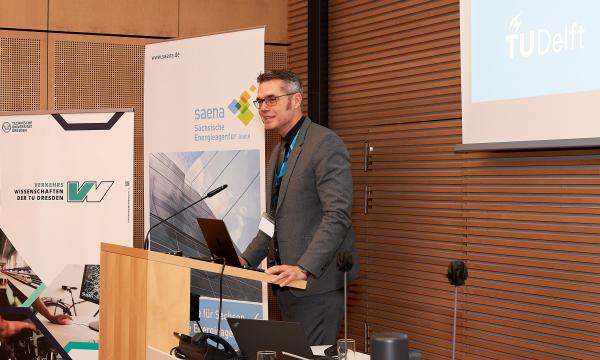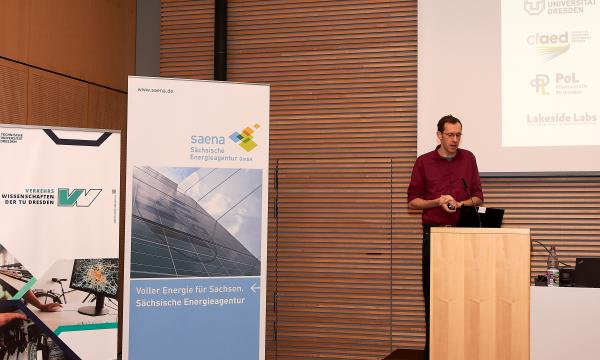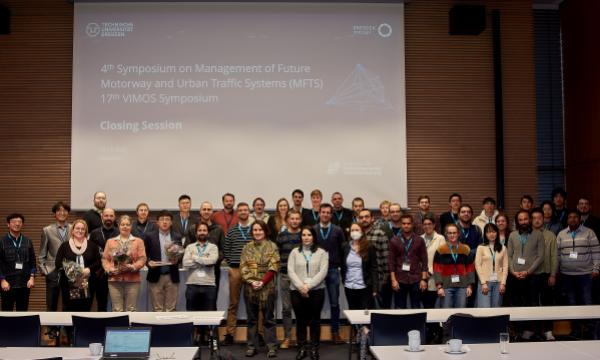
You are here
Chair of Traffic Process Automation
At the end of November, high-ranking scientists from all over the world discussed designing future and sustainable highway and urban traffic systems.
The first joint conference of the international 4th Symposium on Management of Future Motorway and Urban Traffic Systems (MFTS for short) and the 17th VIMOS Symposium of TU Dresden took place from November 30 to December 2, 2022 at the Sächsische Aufbaubank - Förderbank - (SAB). The main topic of the conference was "Cooperative Management of Multimodal Transport.” It was organized by Prof Dr. Meng Wang and his team at the Chair of Traffic Process Automation at the "Friedrich List" Faculty of Transport and Traffic Sciences of TU Dresden. 119 guests from 20 countries participated.
Right at the beginning, Prof. Wang highlighted the urgency for all to explore and overcome the given challenges of our time - to protect the climate and to shift to more sustainable transport systems. Increasing urbanization, consistent road congestion, and persistently high traffic fatalities, he claimed, are threatening the efficient and safe operation of our current transportation systems worldwide.
"Intelligent transport system technologies can advance novel mobility concepts."
The conference, Prof. Wang further argued, was an excellent opportunity to exchange ideas and explore new mobility concepts and their opportunities together with academics and practitioners. “Intelligent transportation system technologies can advance new types of mobility concepts by connecting infrastructure, vehicles and other road users. Autonomous systems are increasingly replacing human drivers. Vehicles are being electrified and shared mobility systems, such as car or bike sharing, are expanding their reach,” Wang said.
This area of conflict, he said, is leading to fascinating questions in transportation and traffic science about how road and transit operators, government agencies, industry and academia can work together to address these challenges and capitalize on the resulting opportunities.
Highlights of the Conference
Highlights of the Conference
Highlights of the Conference
Highlights of the Conference
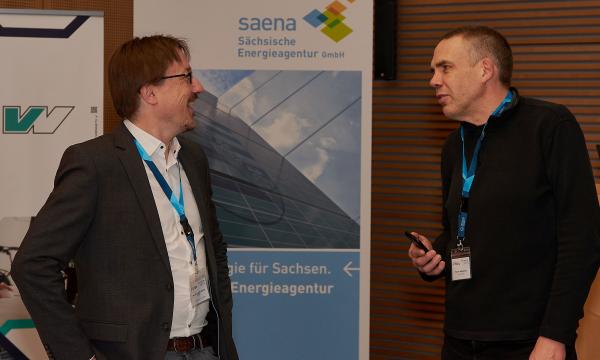
Highlights of the Conference
Keynote speakers at the conference included three renowned professors in the field of transportation and mobility who presented their research activities: Prof. Serge Hoogendoorn (TU Delft/Netherlands) spoke about Multimodal Active Traffic Management, Prof. Ludovic Leclercq (Université Gustave Eiffel/France) about the recent development of trip-based macroscopic fundamental diagram (MFD) models and their applications to urban traffic and mobility services management, and Prof. Marc Timme (TU Dresden) presented on shared and biking infrastructure network problems from a complex and collective system perspective.
Workshop on social and cultural aspects of transport
In addition to the keynote presentations, there were a number of talks and workshops that asked, for example, how mobility behavior after disruptive events could be better predicted in a post-covid world. A panel discussion looked at the challenges of traffic and transportation management in the field. Here, participants concluded that new technologies need to be launched in cooperation with the social sciences in order to overcome process-related hurdles of access and understanding. Another workshop examined the social and cultural aspects of transport. The conclusion was that the importance of gender and diversity aspects as well as emotional and symbolic aspects still play a subsidiary role in the transport sciences, which are rather oriented towards instrumental research.
At the beginning of the conference, the Dean of the "Friedrich List" Faculty of Transport and Traffic Sciences, Prof. Dr.-Ing. Regine Gerike, as well as the Head of the Department Mobility Strategy of the Saxon State Ministry of Economy, Labor and Transport, Michael Stritzke, delivered a greeting.
After a productive and fruitful scientific exchange, the conference participants had their festive dinner in the Luisenhof Dresden. The DVB, the local public transport in Dresden, provided a special train service from the conference venue to the dinner - a special experience for the national and international guests.
Review of previous MFTS symposia:
- 1st MFTS, Chania (Greece), TU Crete, 2016.
- 2nd MFTS, Ispra (Italy), Joint Research Centre, 2018
- 3rd MFTS, Luxembourg, University of Luxembourg, 2020.
Chair of Traffic Process Automation
The Chair of Traffic Process Automation sets its vision as an internationally recognized group in ITS research and education, in particular on leveraging ICT and emerging mobility concepts to optimize the system operations of multimodal transport under multiple objectives of efficiency, safety, and sustainability.
The focal area of research of the Chair of VPA includes traffic state estimation, prediction and control; cooperative and automated traffic systems; public transport priority, and safety of vulnerable road users.
VIMOS
The competence center VIMOS promotes the exchange of information between practice and research on the basis of an interdisciplinary cooperation of research institutions, traffic planning offices, offices responsible for traffic and mobility as well as offices oriented toward intelligent transport systems.
(https://tu-dresden.de/bu/verkehr/vis/vpa/vimos?set_language=en)
The Dresden traffic management system VAMOS evaluates data from more than
1,800
raffic sensors in the Dresden road network.

